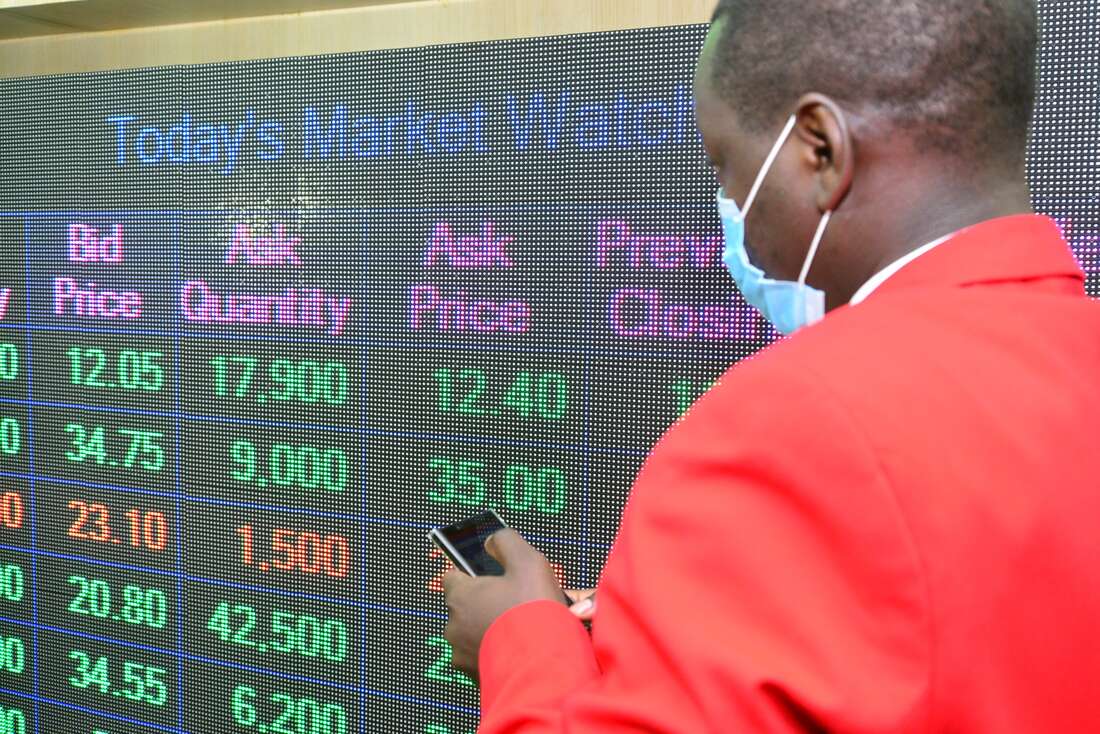What are the alternatives to Safaricom share price gains?
[ad_1]
Chroniclers
What are the alternatives to Safaricom share price gains?
Wednesday 22 September 2021
A stockbroker at the dealing room of the Nairobi Stock Exchange. PHOTO FILE | NMG
Summary
- Outrageous stock price gains for Safaricom mean shares in the phone company have reached an unusual status: a 60 percent concentration of total market capitalization.
- This is a worrying concentration that is already undermining the interpretive value of the NSE 25 equity index – proxy for the whole market.
- Even casual market watchers probably can’t help but notice that the stock has more weight in the NSE 25 equity index than the other eight industry sectors, including banking and manufacturing groups.
Outrageous stock price gains for Safaricom #ticker: SCOM means shares in the telecommunications company have reached an unusual status: a 60 percent concentration of total market cap.
This is a worrying concentration that is already undermining the interpretive value of the NSE 25 equity index – proxy for the whole market.
Even casual market watchers probably can’t help but notice that the stock has more weight in the NSE 25 equity index than the other eight industry sectors, including banking and manufacturing groups.
It just means that the equity index is narrow and does not represent the “real†market. In other words, his fortune is tied to the telephone company.
Indeed, at some point, Safaricom will no longer support the market and will weigh it down on the contrary. It is not sustainable.
Of course, the increasingly heavy weight of Safaricom is stimulated by its strong outperformance; since early 2019, its share price has doubled while the NSE stock market index has gained only 7.2%.
High growth expectations anchored in its entry into new markets, a strong grip on market share and new products suggest that “the current concentration may be more sustainable” and that a sharp drop may not be a real concern. .
Moreover, the heaviness of the market is not entirely a “Safaricom affairâ€. The first nine issues (excluding Safaricom) of the NSE 25 Share Index represented nearly 30% of the weight of the index in June 2021.
Either way, the concentration of Safaricom has created a real distortion. Being a growth stock, its 60 percent concentration means that the benchmark is very growth oriented.
Moreover, by excluding Safaricom from the NSE 25 index, the local market has not budged at all. Its extreme concentration clearly gives an unreliable view of the equity markets.
Looking at the problem closely, it all stems from how this index is calculated. The NSE 25 Stock Index is a market capitalization weighted index, which means larger stocks have more influence (the NSE 20 Stock Index is price weighted).
Typically, market capitalization weighted indices, by construction, take on significant structural biases that change over time, which means that strong performance easily increases the weight of any stock in the index.
The big question; are there alternatives to capitalization-weighting? Not a perfect answer, but an equally weighted index is a good alternative.
An equally weighted index will contain the same 25 names but assign the same weight to each by weighting them by size. Thus, it almost eliminates the problem of risk concentration.
Studies show that equally weighted indices tend to do better when earnings are distributed across companies.
Obviously, not all indices are weighted the same. Some are more “equal” than others. When the market experiences increasing concentration on the local stock exchange, it is necessary to display a balanced and accurate representation of the market.
An equally weighted index presents an excellent alternative in this case. Without this alternative, if Safaricom continued its meteoric rise, the NSE 25 stock index would continue its “distortionâ€.
Mr. Mwanyasi is Managing Director of Canaan Capital
[ad_2]

